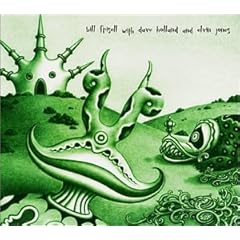 Opening moments from saxophonist Myron Walden’s new album sound as if trumpeter Darren Barrett (who has played with Roy Hargrove and Elvin Jones) is leading the band. Walden's writing has the horns crashing through the gates and hammering holes through the album’s first song, Of Three Worlds. Walden and drummer, Kendrick Scott, cruise fluently together around their universe with a quintet rounded-out by David Bryant on piano and Yasushi Nakamura on bass.
Opening moments from saxophonist Myron Walden’s new album sound as if trumpeter Darren Barrett (who has played with Roy Hargrove and Elvin Jones) is leading the band. Walden's writing has the horns crashing through the gates and hammering holes through the album’s first song, Of Three Worlds. Walden and drummer, Kendrick Scott, cruise fluently together around their universe with a quintet rounded-out by David Bryant on piano and Yasushi Nakamura on bass.
A Bitches Brew vibe is thick during track three, allowing for a spacey piano binge before returning to the main theme in, Pulse. The work of Miles Davis, as an inspiration, comes to a head in the fifth track, Miles. Walden, performing alongside Wynton Marsalis, Nat Adderly and Freddie Hubbard over the years, give Miles’ music another look – a deep, dramatic stare. It’s a scowl with a smirk. Call it a tip of the more modern, proverbial, fedora.
After a solid tribute, a quick tune that appears again later, When Time Stood Still, creates an opening in the album for a more exciting, daring and experimental route. What Goes Up Must Come Down continues the scientific string of pace with drums following Walden’s atomic attack. He bleeds and barks, yet again, he returns to the roots of his composition like a specialist.
Longing is perfectly titled and its’ searching, soundtrack flows into a sandwich of sprints and Carnage. The terrifying title remits a refusal to die near the end of the album’s eleventh song. Drummer Kendrick Scott keeps things alive during a pounding and alarm-style attack, closer to an assault.
Another version of When Time Stood Still polishes the 90-second (tracks 6, 9 and 12 are roughly a minute and a half) knock-out. Walden and the band slam on the brakes as an album of pushing jazz to the edge comes to a sudden halt – saving the thrust for last. Strategically stacked, Momentum uses a solid base of modern jazz motion to carry the record forth into a fantastic furry, featuring a fluid, hard-bop finale.



